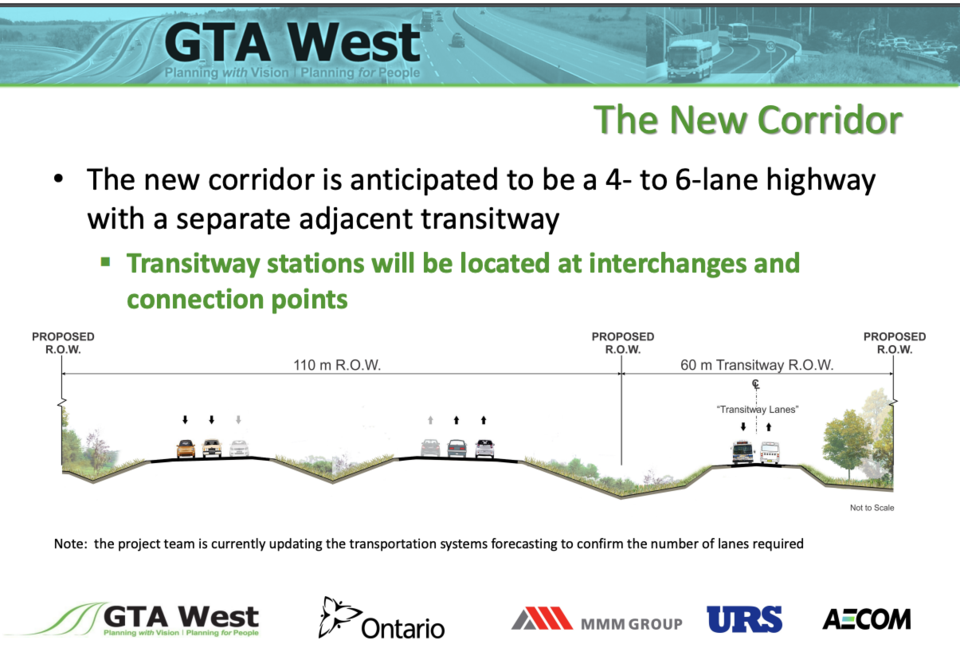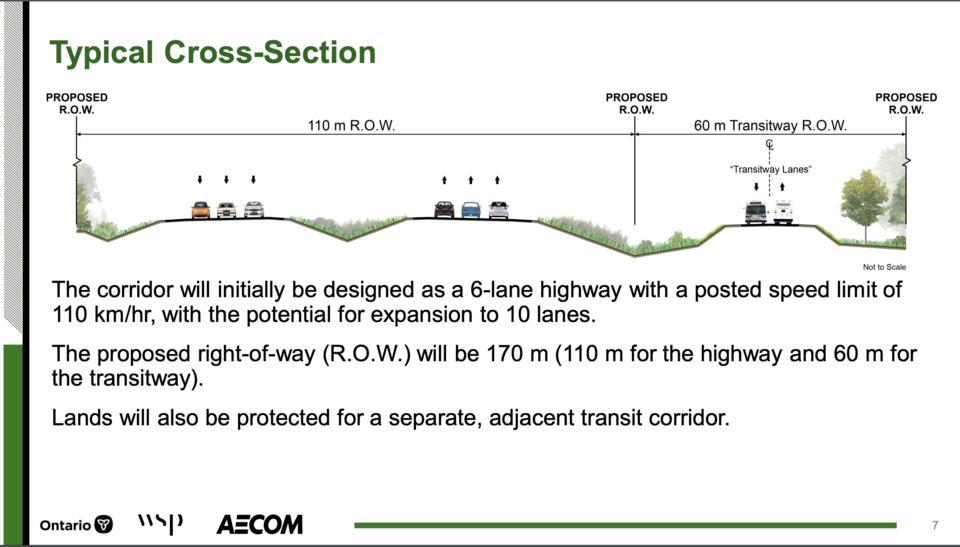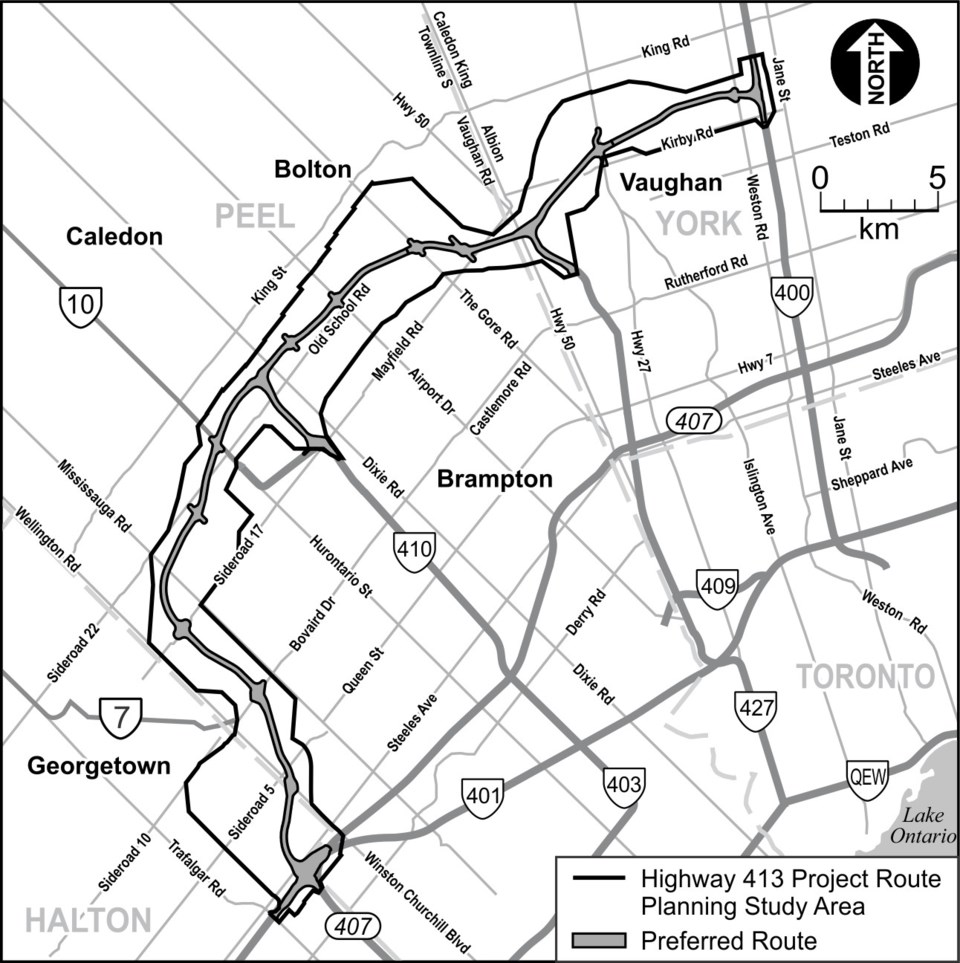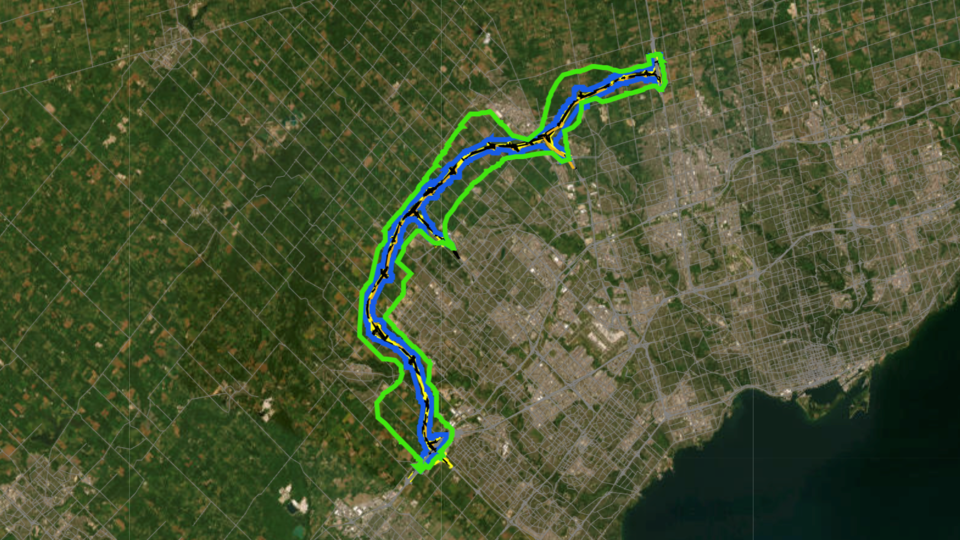Editor's note: This article originally appeared on The Trillium, a Village Media website devoted exclusively to covering provincial politics at Queen’s Park.
The Ford government has so far pitched Highway 413 as a four- to six-lane highway, but documents obtained by The Trillium show the province is considering something much bigger.
“Highway 413 was designed with four-lane sections and six-lane sections in mind. By 2041, it will be at or near capacity," reads a statement from the Ministry of Transportation's project team, in notes from a meeting with Environmental Defence's Keith Brooks and Tim Gray in November 2022. "When we perform the environmental assessment, we protect the space necessary for 10 lanes in case expansion is needed in the future.”
The Trillium obtained the notes via a freedom-of-information request seeking documents about "induced demand."
Ministry of Transportation spokesperson Tanya Blazina confirmed the highway will have "the potential for expansion to 10 lanes in the future, if warranted."
"This was shared during public information centre sessions in 2014," she said, pointing to a summary report from when the previous Liberal government studied the project.
A slide in that report describes it as a "four- to six-lane highway." It does not mention a potential 10-lane expansion — only that the ministry is working to "confirm the number of lanes required."
The ministry used the same illustration In an online town hall last month, but said the highway will have "the potential for expansion to 10 lanes."


"I think the troubling piece is that they're not being open about the plan here. They project that this highway is going to be bumper-to-bumper by 2041," Brooks, Environmental Defence's programs director, told The Trillium on Thursday. "They're selling the public that this is going to save you time, here's this road free of congestion, when their own models show it's gonna be bumper-to-bumper."
It's not the first time the Ford government has considered expanding a highway project. The Toronto Star and Narwhal reported last year that the Bradford Bypass could also double from four to eight lanes.
More lanes mean more paved green space, more pollution and more greenhouse gas emissions, Brooks said.
"It's really more of the same, right?" he said.
Highway 413 is a planned 59-kilometre route that would connect Highway 400 just north of Vaughan to the Highway 401/407 interchange at the edge of Mississauga. It would stretch across York, Peel and Halton regions, including dozens of water crossings and 163 hectares of the Greenbelt.
Almost 30 per cent of the highway would cross agricultural or other environmentally designated land, the ministry said at the most recent town hall.
The project would also be a boon to developers with land nearby. Many of those who had their Greenbelt land rezoned for development had cited the Highway 413 as a reason protections should be removed.
The government has not said how much it will cost. Some estimates have pegged it at $6 billion to $10 billion.

Premier Doug Ford has argued it would save the average commuter half an hour every day. The previous government estimate pegged the time at 30 seconds.
One study, commissioned by Environmental Defence, found congestion could be eased by opening up the tolled Highway 407 to trucks. But the ministry has said the province's agreement with the privately run 407 is to keep traffic in a "free flow" state.
"So we're supposed to build another public highway — supposed to spend another, is it $10 billion now? We don't know, maybe more — to build this other highway that will get congested," Brooks said.
Unfortunately for the Ford government, the project itself also appears to be gridlocked.
The Trudeau government's Impact Assessment Act lets the feds step in if a provincial project overlaps with federal issues like Indigenous peoples, climate change or species at risk. Ottawa launched an environmental assessment back in May 2021 after the Mississaugas of the Credit First Nation and Ecojustice/Environmental Defence raised concerns about those topics.
The Impact Assessment Agency of Canada's report describes it as a four- to six-lane highway, but Ontario's Ministry of Transportation said the agency is aware it could expand to 10 lanes.
The PC government has argued the feds need to stay in their lane, and the Supreme Court evidently agrees, ruling the federal act unconstitutional last month. The Liberals will likely tweak the law to comply.
But while the law is still on the books, Ontario will have to prove it can build the highway without disturbing protected species along the route. The ministry plans to submit those justifications by the end of 2023.
Under the current law, the project could still be delayed for years. Its uncertain future is another blow to Doug Ford's picket-fence vision for the GTA, driven by single-family homes and cars. He recently walked back his plans to develop the Greenbelt and expand municipal boundaries after massive public pushback. Now, his new housing minister is telling municipalities to densify.
Environmental advocacy groups say the recent reversals have freed up more time to fight the highway.
"We've been working to try to stop Highway 413 since 2012, or something like that," Brooks said. "So this isn't a new battle for us."
